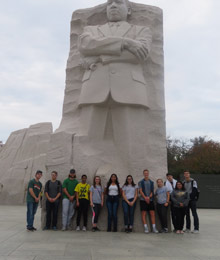Remembering Martin Luther King Jr. is to Remember Albion’s Place in America
Related Posts
Connect With Us
April 4, 2018
By Wesley Arden Dick
April 4, 1968 lives in infamy—the day that Dr. Martin Luther King, Jr. was shot and killed while standing on the balcony of the Lorraine Motel in Memphis, Tennessee. I heard the news at Albion College’s Bellemont Manor, my residence while I interviewed for a job as a history teacher. It was my first visit to Albion.

Students from Professor Wes Dick’s First-Year Experience seminar “A Sense of Place: Albion & the American Dream” stand in front of the Martin Luther King monument in Washington, D.C.
Albion College and Albion town were connected to Martin Luther King, Jr. before 1968. Dr. King spoke at Goodrich Chapel on March 13, 1963 on the “The American Dream.” The headline in the Albion Evening Recorder read: “Dr. Martin L. King, Speaking Here, Warns: ‘Northern Segregation May Be More Serious.’” Dr. King spoke to students, faculty, and the community. He answered questions in Goodrich and met 100 people informally at a reception in the Mary Sykes Room in Baldwin Hall. That evening reminds us that Albion’s story is America’s story.
Fast forward to April 1968 when the shock of Dr. King’s assassination reverberated across the nation, unleashing anger, frustration, and violence. Uprisings and riots erupted in more than 100 cities across America. One book title, “Ten Blocks From the White House,” captured that moment vividly as Washington, D.C.’s inner city went up in flames.
What happened in Albion? The Recorder recalled King’s Albion’s visit. Albion College held a special service at Goodrich Chapel, where King had spoken five years earlier. President Louis Norris told the audience: “’We turn in this hour of national tragedy with heavy hearts,’ and asked God to ‘lead us in good efforts towards reconciliation.’” Norris prayed that, “’We shall overcome that that divides man from man.’”
Albion High School students staged a march, carrying a casket in memory of Dr. King. The march was led by Reverends R. V. Davis and Marion Wheeler. Albion police escorted the 200 marchers from West Broadwell Street to the high school, where they held a memorial service in the auditorium. Senior Charles Jones, Jr., Daniel Boggan, Jr., a University of Michigan graduate student and Albion Action Center staff member (Albion College class of 1967) as well as Davis and Wheeler spoke at the memorial.
Prayers, reconciliation, and memorials were in order. Simultaneously, Albion became one of the 100-plus cities that experienced violence in response to King’s assassination. Recorder headlines began: “Nation Mourns in Wake of King’s Assassination.” That was followed by “20 Dead Following Trouble in 40 Cities.” Then, the story came home to Albion: “1 Arrest Follows Firing of Shots at Police Here. 9 Fire Bombing Reports During Weekend; Carrigan, Yankee Stores Heavily Hit.” “In Aftermath to Saturday-Sunday Acts of Violence: 9 In Custody Here On Arson Charges.” Albion also reflected America’s anger.
Fifty years later is a time for reflection and for honoring our history. Nationally, there is a King holiday and his statue stands tall along the tidal basin in the nation’s capital. King’s name graces Albion city streets, visitors to Albion College’s “Rock” are greeted by a King quotation, and each year the signature College-Community collaboration is the Martin Luther King, Jr. Convocation. The Albion NAACP remains dedicated to realizing King’s vision. King is alive in Albion and his life continues to inspire and challenge us in creating the beloved community.
In pain, memorial, anger, and struggle, Albion’s story has been and continues to be America’s story.
Wesley Dick has been an Albion College history professor for 50 years. Among the courses he teaches is a First-Year Experience seminar called “A Sense of Place: Albion and the American Dream” that he teaches with his wife and historian, Leslie.